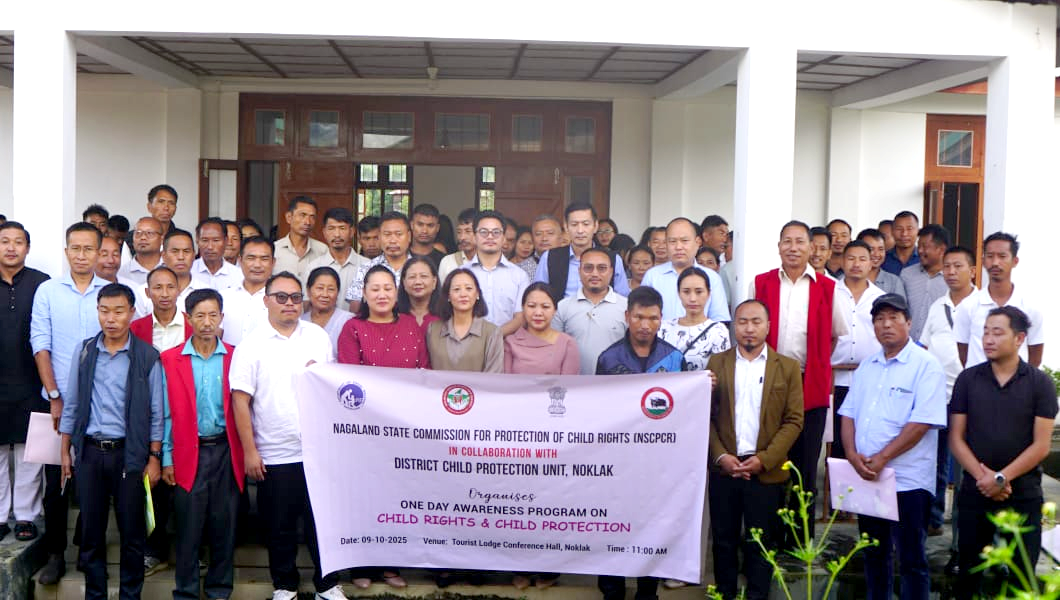The Nagaland State Commission for Protection of Child Rights (NSCPCR), in collaboration with the District Child Protection Unit, Noklak, organized a One Day Awareness Programme on “Child Rights & Child Protection” on October 9 at Tourist Lodge, Conference Hall, Noklak, Nagaland.
Deputy Commissioner, Noklak, P Mono Khiamniungan stated that the Social Welfare Department is a broad department that covers welfare services for all age groups from children to the elderly. Among these, child welfare is one of the most important areas, he said.
The DC encouraged everyone to actively participate in awareness programs related to child welfare and assured that the District Administration is always ready to extend all possible assistance in this regard. He further mentioned that during the last DBDP meeting, discussions were held on establishing institutions related to child welfare in the district.
Legal Consultant, NSCPCR, Lichani Murry emphasized on the overview on the Juvenile Justice Act highlighting on adoption rules. She explained that the Juvenile Justice Act, 2015 provides a comprehensive system for the care, protection, and rehabilitation of children. The Act ensures that every child receives proper care, development, and social reintegration through a child-friendly approach in the administration of justice. She emphasized that its primary aim is not punishment, but helping children lead dignified lives.
Murry stated that the Act defines a child as any person below eighteen years of age and classifies them into two groups: children in conflict with law, referring to those who have committed an offence before turning 18, handled by the Juvenile Justice Board (JJB), and children in need of care and protection which deals with orphaned, abandoned, abused, or exploited children, cared for under the Child Welfare Committee (CWC). She highlighted the various institutions and mechanisms under the Act, such as Mission Vatsalya, District Child Protection Units, Juvenile Justice Boards, Child Welfare Committees, Childline 1098, and the State Commission for Protection of Child Rights, ensure timely support for children in distress.
She stressed that children are entitled to medical and legal aid, and that parental or guardian involvement is vital in the rehabilitation process.
Member of NSCPCR, Akumla Longchari emphasized that any child, regardless of gender, can become a victim of sexual offences. She highlighted that many cases remain unreported, and in most instances, 80 to 90 percent of offenders are trusted persons, including family members or known individuals. She also noted that offenders can even be female, stressing that abuse can occur in any environment.
Longchari explained that the POCSO Act identifies six types of sexual offences and ensures strong legal protection for children. She underlined the role of institutional and legal stakeholders which includes the Police, Child Welfare Committee (CWC), District Child Protection Unit (DCPU), Juvenile Justice Boards (JJBs), and Special POCSO Courts, in ensuring the safety and well-being of children.
Download Nagaland Tribune app on Google Play

The speaker informed that reporting of offences is mandatory and should be done through the Special Juvenile Police Unit (SJPU) or the Child Helpline 1098. She reminded that under the POCSO Act, maintaining confidentiality of the child’s identity is a legal requirement. She also highlighted the importance of child-friendly procedures, encouraging stakeholders to create a safe and supportive environment for victims during the investigation and trial process.
She urged parents, teachers, and community members to identify warning signs in children and to ensure the child’s mental health and emotional support after any incident is reported. She further stressed the need for preventive education, teaching children about personal safety, boundaries, and reporting mechanisms.
Longchari emphasized that protecting children is a shared responsibility and that spreading awareness at every level of society is crucial to prevent abuse and ensure a safe environment for every child.
Member of NSCPCR, Aying Wangsha, spoke on rights of children with regard to education with emphasis to child labour. She stressed that the Right to education (RTE) Act guarantees inclusive education for all children and establishes an anti-discrimination framework to ensure that no child is denied access to education. She highlighted prohibited practices in schools and stressed the importance of adequate infrastructure to facilitate learning. They emphasized that local authorities are responsible for providing accessible schools, with the goal of having a school in every village.
Wangsha also covered parental duties and responsibilities in ensuring children attend school. She stressed that the issue of child labour is a major concern, particularly in eastern Nagaland, where children are often deprived of education. She noted that employing children is a punishable offence, with imprisonment as a penalty. She strongly appealed to all stakeholders to ensure that children receive their right to education.
Earlier, a keynote address was given by NCS Secretary Social Welfare & Secretary, NSCPCR, Yongchingkumla, emphasizing that the present team has been actively working to spread awareness on child rights, and noted that people are gradually opening up to these discussions despite the society being traditionally reserved and conservative. It was priorly covered in Shamator and Tuensang, she informed. Noklak being a full-fledged district, the need for awareness programs is particularly significant, she added. . The speaker highlighted the importance of collaboration among various commissions, the Departments of Education and Health, the Social Welfare Department, and the police, working together to safeguard child rights.
A brief report on child related cases in the district was presented by CWC and JJB.
Earlier, the program was chaired by Hatho P, Project Coordinator (CHL), invocation was pronounced by Penglang, Pastor, Noklak Town Baptist Church. A fruitful open house discussion was followed.

